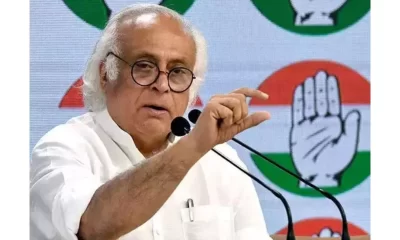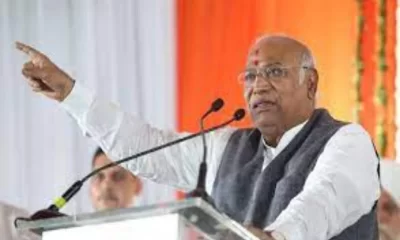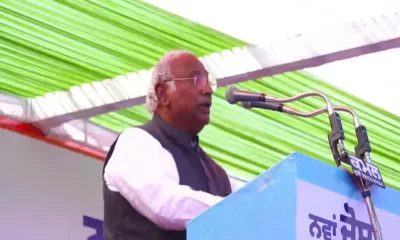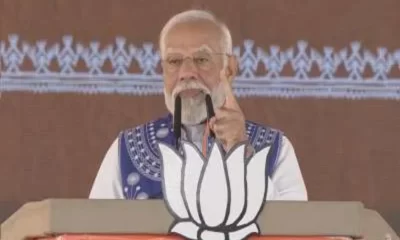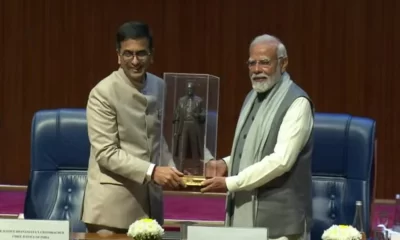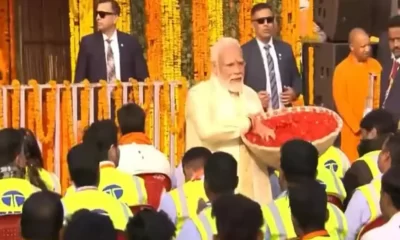Latest world news
World Leaders and Cyber Security
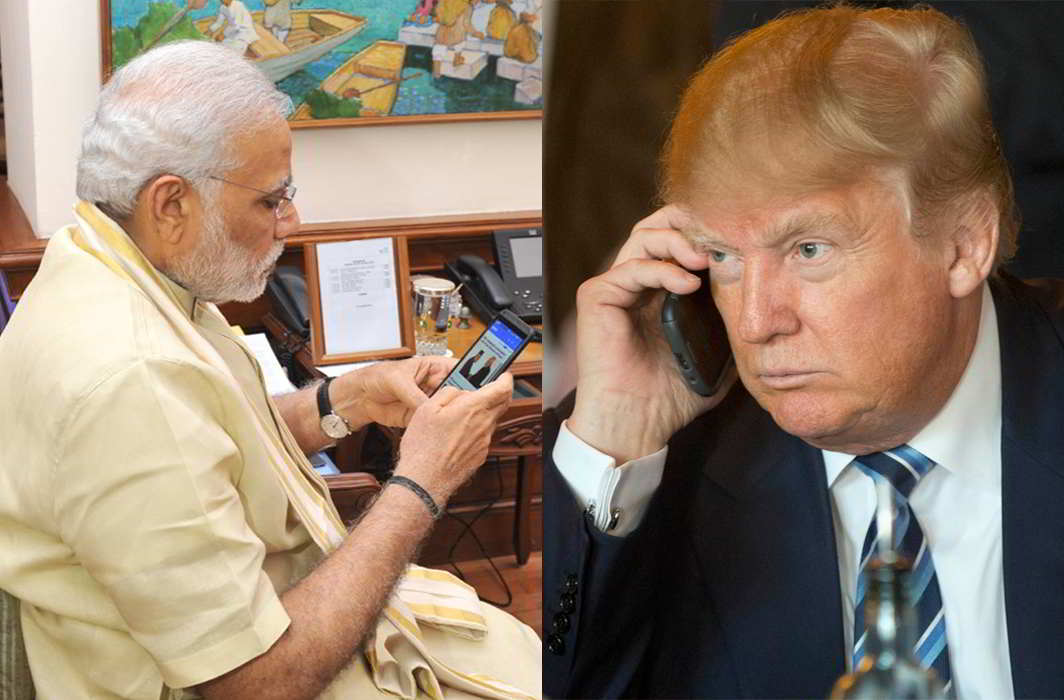
[vc_row][vc_column][vc_column_text]There is reason to be cautious, whether you are in India, or in the US—Modi or Trump
By Sujit Bhar
Eric Geller, an American cyber security reporter, reiterates in Politico that the Android phone that US President Donald Trump uses could be a cyber security threat for the White House and even for those inside the administration. Trump has been given a super secure, encrypted phone by his security aides and Geller quotes a New York Times report which said Trump keeps using “his old, unsecured Android phone, to the protests of some of his aides”.
He lays out two troubling issues. First, Trump reportedly uses a 2012 Samsung Galaxy S3, that “no longer receives software updates from their manufacturers or wireless carriers”. Which, in turn, means that it is open to security threats. Secondly, he points out that while Google’s Android technology offers many more options to the user than an Apple iPhone does, it is hardly secure. The Apple encryption, on the other hand, is so secure that even the FBI has reported that it can’t break through.
So what are the problems? Geller talks about a research that found “one of the most dangerous Android vulnerabilities, the so-called Stagefright bug, which lets hackers take control of a phone using only a text message.”
Now that is scary. Geller talked to Matthew Green, a computer science professor at Johns Hopkins University, who said: “It’s just crazy that the president is interacting with such an out-of-date and likely insecure device.” This was echoed by Bruce Schneier a leading cyber security expert, who told Politico: “His (Trump’s) off-the-shelf Android could potentially become a room bug without his knowledge. An attacker could certainly hijack his apps.”
The question is whether Trump uses this phone to discuss state secrets, in which case somebody can easily snoop. If he texts from this phone, it possible that somebody (outside the administration) can read it. And since Trump is a Twitter-bug, a quick entry point is provided to the hackers through this.
This was made evident in India through hackers who call themselves ‘Legion’; they had hacked into the email databases of some top journalists. That would be chicken feed if top hackers of the world manage to plant a Trojan-type bug into Trump’s phone and then start listening.
Technically, Trump’s using his personal Andriod phone for official purposes would be akin to Hillary Clinton using her personal email to transfer important state documents; an issue Trump has never stopped harping on.
Okay, there is this knowledge that Trump actually is less of a cyber guy and uses paper from a small notepad to scribble instructions. That, though, remains in the realm of uncertainty.
Epiphany time
What this has done is that it has enlightened the pubic on the risks of existing in an insecure cyber atmosphere. India has taken this seriously too. Indian Prime Minister Narendra Modi has been seen with a number of phones, and there is curiosity as to which brand his phone actually is. But he has also been seen with an iPhone, and this probably is because of its security features.
It is possible to secure an Android phone to only that extent. The intrinsic security structure of an iPhone has been upgraded to a very high level. So Modi, who is also a bit of a Twitter-bug will be secure while doing so.
India is trying to get its act together as far as cyber security is concerned.
According to the site SecurityIntelligence there is major work on to bring India on a par with international security standards. India is set to introduce freshly minted encryption and privacy policies and will move to amend the existing laws that mostly fail to address international systems, and link with international law-enforcers.
To start with, Indian has appointed a Chief Information Security Officer (CISO). At this point there is no national agency that can assess India’s cyber security threats and weave responses. This is in the discussion stage, but things are moving fast. However, top level officers and the Prime Minister cannot wait for a system to be in place before securing national secrets and himself.
During Modi’s trip to the US in the Barack Obama regime, he had talks with the Americans regarding US-India Cyber Relationship Framework which will lead to legal frameworks as well as proper mechanisms for implementation. This has not, yet, translated into a treaty.
India has cyber security deals with Malaysia and the European Union and more countries would soon come into this ambit.
India is in a position to secure top government offices with alacrity, because India can afford to leapfrog the preliminary stages of development of a security system and directly adopt one that has worked so far.
This is also relevant to commerce and industry. A report, “2016 Cost of Data Breach Study: India” said such cost increased 9.5 percent for each Indian company, with 41 percent of all Indian companies experiencing such data breach. This could be disastrous in the software and the pharmaceutical industries, which are India’s Intellectual Property strengths at this point of time.
Maybe Modi understands the threats a little more than Trump. There is reason to be cautious, whether you are in India, or in the US. Every level of citizenry is under a threat perception, probably for the first time in history.[/vc_column_text][/vc_column][/vc_row]
Latest world news
World Earth Day 2024: Google Doodle showcases aerial view of planet’s natural beauty
Google celebrated Earth Day 2024 with a special doodle featuring an aerial view of our planet’s biodiversity.
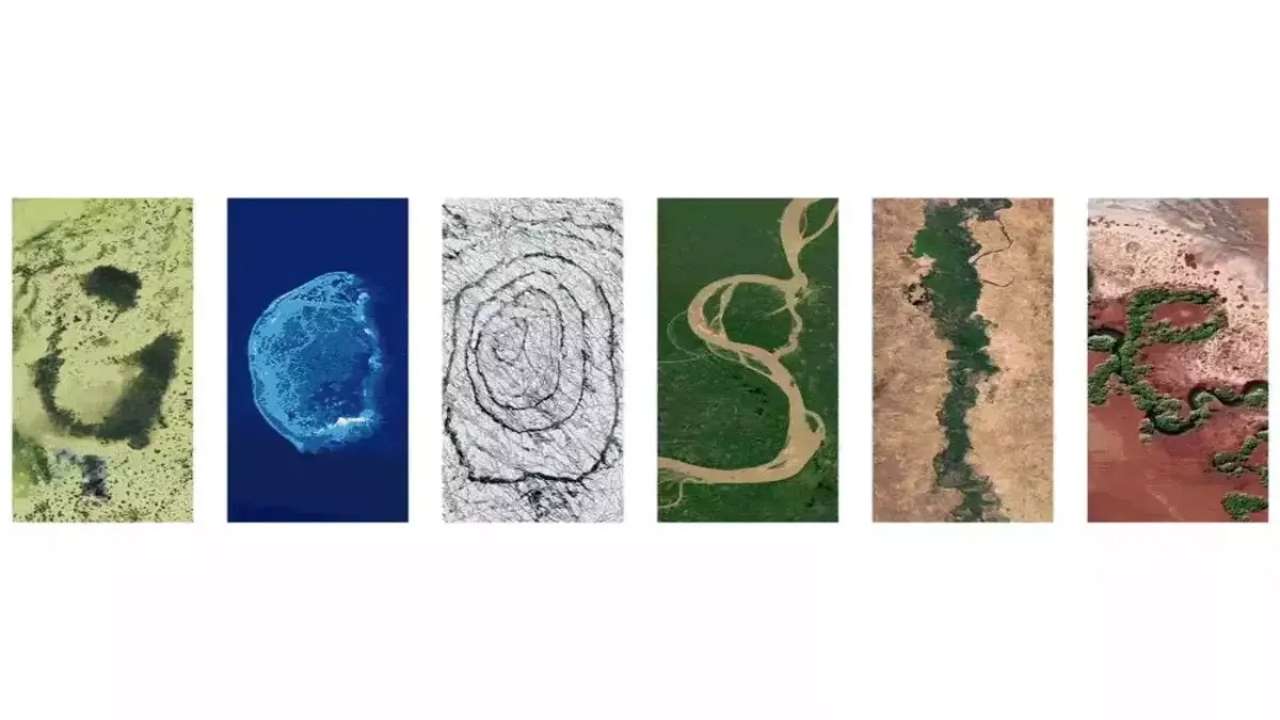
Google shared a doodle today to celebrate World Earth Day 2024, which showcased aerial photos of the planet’s biodiversity and natural beauty. Google reminded us of the importance of protecting planet earth for future generations with the help of this doodle.
The Google letters depict specific locations across the globe where people, communities, and governments work every day to help protect the planet’s natural beauty, biodiversity, and resources, according to the explanation of the annual Earth Day 2024 doodle on their website.
It said, these examples remind us that there’s much more to do to address the climate crisis and biodiversity loss, but also offer the promise of hope and optimism.
The islands of Turks and Caicos are represented by the letter “G.” The islands’ conservation efforts are concentrated on protecting important regions for biodiversity and addressing persistent environmental problems.
The largest reef in the southern Gulf of Mexico and a UNESCO biosphere reserve, Scorpion Reef National Park, is represented by the letter “O” in the Mexican flag.
The letter “O” features Iceland’s Vatnajokull National Park, which was designated as a national park in 2008 following decades of advocacy. The ecology within and surrounding the biggest glacier in Europe is safeguarded by this UNESCO World Heritage Site.
The letter “G” has the Jau National Park in Brazil on it. It is a UNESCO World Heritage Site and one of the biggest forest reserves in South America.
The Great Green Wall of Nigeria is represented by the letter “L,” and the Pilbara Islands Nature Reserves of Australia are represented by the letter “E.”
Meanwhile, Earth Day is a worldwide event that promotes protection of the environment every year. April 22 serves as a reminder of the importance of conservation efforts and sustainable practices to guarantee a healthier world and a brighter future.
The occasion inspires people across the world to come together and take action to protect the environment, strengthening our bonds with nature and promoting good change.
Latest world news
Bigg Boss 14 contestant Rahul Vaidya struggles walking in knee deep water, compares Dubai rains with Mumbai floods
Singer and TV personality Rahul Vaidya was recently stranded in the Dubai rains.

Rahul Vaidya, who was in Dubai ahead of his show which was scheduled to take place today, left the country due to heavy rains and reached Kolkata. The artist shared on social media his encounters in the UAE city, including challenges like walking through knee-deep water. Rahul provided an update regarding the heavy rainfall in Dubai on his Instagram profile.
The Bigg Boss 14 contestant revealed that he was in Kolkata and prepared to do an evening performance. Recalling the terrifying period he went through, Vaidya said there was a lot of confusion and panic in Dubai. The situation was similar to that when heavy floods hit Mumbai in 2005.
Vaiday also posted seval other images and videos of cars that were underwater and flooded roadways. The Bigg Boss 14 contestant, who shared his ordeal, claimed that even though it had just rained for two hours, the situation was dire.
In one of the video, which went viral he can be seen struggling in walking in knee-deep water. He can be also seen holding his sneakers in one hand and with other hand he was seen managing other things.
This is the result of the two hours of rain that it had, he can be heard saying in the video. Vidya also said he dosen’t believe Dubai is accustomed to a lot of rain. Everything had stopped working, he remarked.
After taking part in the first season of the singing reality show Indian Idol, Rahul Vaidya gained widespread recognition. In addition to Bigg Boss, he took part in Khatron Ke Khiladi 11.
Meanwhile, heavy rains that triggered flooding in the UAE and Bahrain, which left 18 people dead in Oman on Sunday and Monday, have paralyzed the financial hub of the Middle East, Dubai.
A lot of incoming flights were diverted from Dubai’s international airport because of the rain. At 7:26 p.m., the busiest airport in the world for foreign visitors stopped accepting new arrivals; a gradual resumption was announced for more than two hours later.
Images of planes navigating flooded tarmacs are making the rounds on social media.
According to pictures shared on social media, the flagship malls Dubai Mall and Mall of the Emirates both experienced heavy floods, while at least one Dubai Metro station had water up to the ankles.
There were several road collapses, severe flooding in residential areas, and numerous reports of leaks from windows, doors, and roofs.
Due to the unfavourable weather, schools around the United Arab Emirates were forced to close, and as more storms are predicted, the closures are anticipated to last until Wednesday. The government of Dubai allowed its staff to work remotely till this Wednesday.
Latest world news
Dubai sky turns green during storm in UAE, video goes viral
The UAE witnessed record-breaking rainfall on Tuesday and the National Centre of Meteorology recorded 254 mm of rainfall in less than 24 hrs in the Khatm Al Shakla area in Al Ain.

1 person was killed in UAE as it witnessed heavy rainfall on Tuesday, stranding commuters, flooding roads, disrupting trains and flights and resulting in water leakage from mall ceilings. The UAE witnessed record-breaking rainfall on Tuesday and the National Centre of Meteorology recorded 254 mm of rainfall in less than 24 hrs in the Khatm Al Shakla area in Al Ain. It is being said that the rainfall was the highest documented since the start of data collection in 1949.
The heavy rainfall in UAE came days after a similar situation in neighbouring Oman, where 13 people were killed in flash floods. Many parts of Oman saw torrential rains, which caused students to be trapped in buses and swept away motorists and trapped people in their homes.
Videos from Dubai circulating on social media showed widespread waterlogging on roads in Abu Dhabi, Dubai and other important cities. This left daily commuters in cars and other vehicles struggling to get back home. Dubai metro station too was seen flooded and closed.
One such video circulating on social media shows the aerial view of the city of Dubai from the top of a building. In the video the stormy winds are seen blowing over the city of Dubai. As the storm intensifies the Dubai sky turns green and ultimately gets covered by heavy rainfall. The video has gone viral on social media with more than 1.1 million views.
Another video showed water leakage from the ceilings of shopping malls, flooding the floors and destroying goods. A video which was shot in the famous Mall of the Emirates, showed pieces of ceiling falling as the rainwater gushed inside. Videos from many outlets of the Deira City Centre mall chain showed escalators being rendered unusable. Majid Al Futtaim, the company which owns the Mall of Emirates, said that the shopping complexes have been kept open and the customers are being sent away from the flooded areas.
-
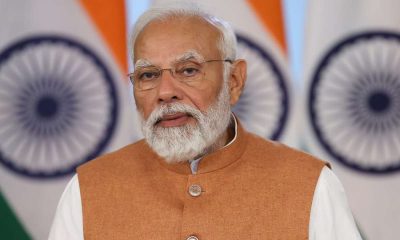
 2024 Lok Sabha Elections18 hours ago
2024 Lok Sabha Elections18 hours agoPM Modi calls for high voter turnout in second phase of Lok Sabha elections 2024, says your vote is your voice
-
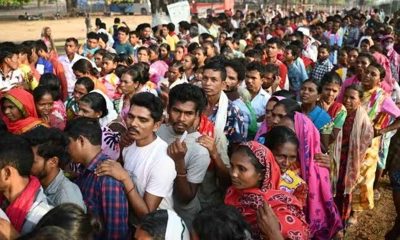
 2024 Lok Sabha Elections13 hours ago
2024 Lok Sabha Elections13 hours agoLok Sabha election 2024: Nearly 50% voter turnout recorded in second phase till 3 pm
-
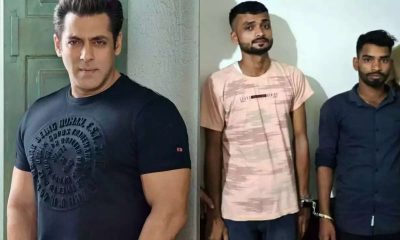
 India News17 hours ago
India News17 hours agoSalman Khan house firing case: NIA interrogates arrested shooters Sagar Pal, Vicky Gupta for three hours
-
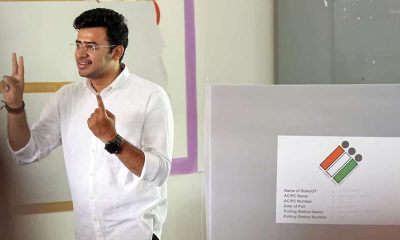
 2024 Lok Sabha Elections11 hours ago
2024 Lok Sabha Elections11 hours agoElection Commission books BJP MP Tejasvi Surya for seeking votes in the name of religion
-
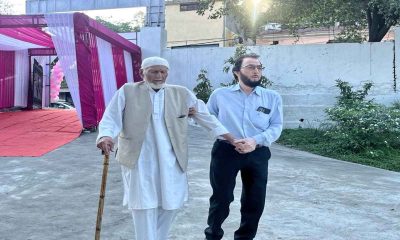
 2024 Lok Sabha Elections16 hours ago
2024 Lok Sabha Elections16 hours agoLok Sabha elections 2024: 102-year-old man walks to polling booth to cast his vote in Jammu

